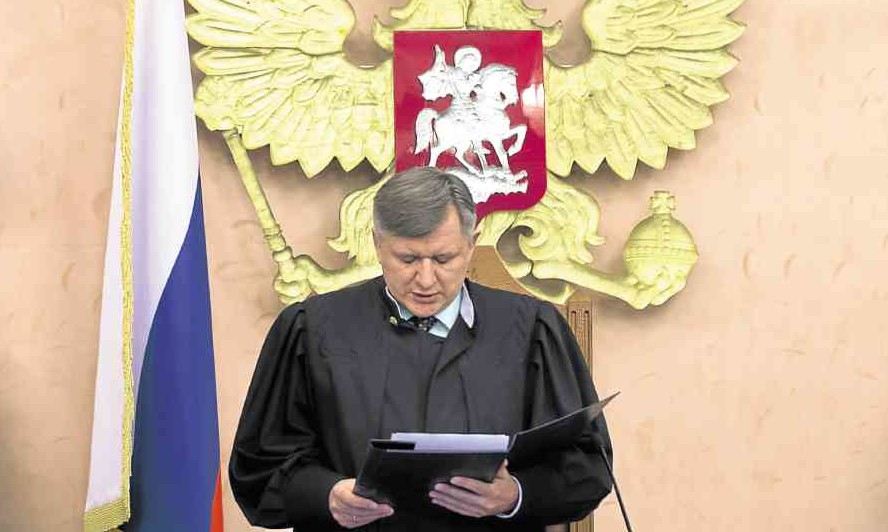Russia outlaws Jehovah’s Witnesses

A Russian Supreme Court official reads the verdict banning Jehovah’s Witnesses as an extremist organization. —AP
MOSCOW — Russia’s Supreme Court has banned Jehovah’s Witnesses from operating anywhere in the country, accepting a request from the justice ministry that the religious organization be considered an extremist group.
The court ordered on Thursday the closure of the group’s Russian headquarters and its 395 local chapters, as well as the seizure of its property.
The Interfax news agency on Thursday quoted justice ministry attorney Svetlana Borisova in court as saying that Jehovah’s Witnesses were a threat to Russians.
“They pose a threat to the rights of citizens, public order and public security,” she told the court.
Borisova also said Jehovah’s Witnesses’ opposition to blood transfusions violates Russian healthcare laws.
Yaroslav Sivulsky, a spokesperson for Jehovah’s Witnesses in Russia, said in a statement they were “greatly disappointed by this development and deeply concerned about how this will affect our religious activity.”
Jehovah’s Witnesses said they would appeal the ruling.
Jehovah’s Witnesses claim more than 170,000 adherents in Russia. The group has come under increasing pressure over the past year, including a ban on distributing literature deemed to violate Russia’s anti-extremism laws.
In a statement in Manila, Dean Jacek, spokesperson for the Jehovah’s Witnesses in the Philippines, expressed concern about the effects of the Russian court’s decision on their Filipino members involved in their worship programs in Russia.
“Our representatives in Russia will appeal this decision, and we hope that our legal rights and protections as a peaceful religious group will be fully restored as soon as possible,” he added.
Jacek said the “aggressive actions” by Russian authorities against the Witnesses over the past 10 years were summarized as the court reviewed voluminous documents on the case.
“Despite the fact that attorneys of the Ministry of Justice could not specify a legal basis for targeting the Administrative Center for liquidation, the Court issued a negative ruling against Jehovah’s Witnesses,” Jacek said.
Human Rights Watch criticized Thursday’s decision as an impediment to religious freedom in Russia.
“The Supreme Court’s ruling to shut down the Jehovah’s Witnesses in Russia is a terrible blow to freedom of religion and association in Russia,” said Rachel Denber, deputy Europe and Central Asia director at Human Rights Watch.
The rights group also expressed concern that if the ruling takes effect, Jehovah’s Witnesses could face criminal prosecution and punishment ranging from fines to prison time. —AP